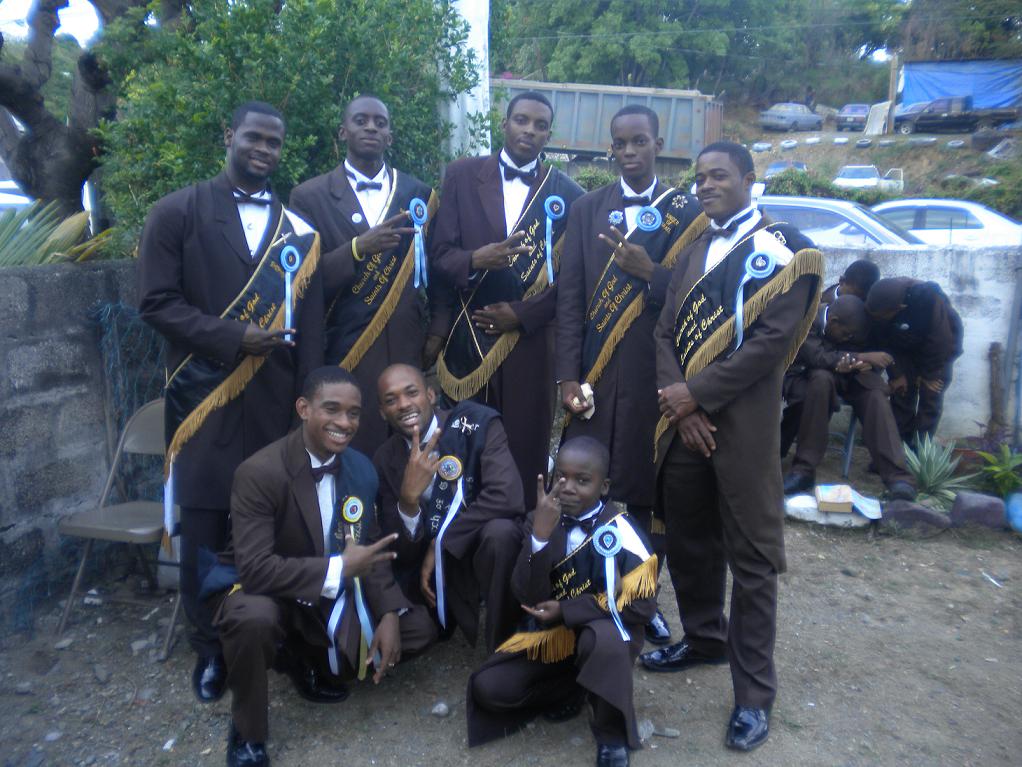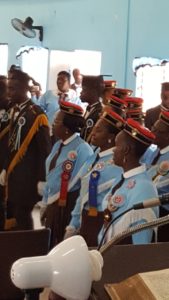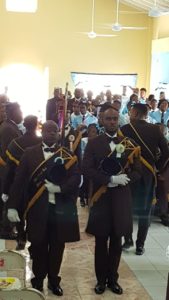Singers of Israel
SONG STYLE, COMPOSITION, AND TRANSMISSION
The choir and its singing are integral components of the structure of all worship services of the Church of God Saints of Christ. There is, in fact, no separate congregational singing, and the choir actually functions as the backbone of the congregation.
Historical Background of the Singing and Marching.
Singing has apparently been an important aspect of the worship services of the Church since biblical times. Church historical accounts after mention both the Prophet’s singing and singing in the Church in general. The earliest songs sung in the Church were apparently pre-composed songs such as hymns.
History of the Choir
Prophet Crowdy himself envisioned the choir and bestowed on it the title “Singers of Israel;” it is thus considered an honor to be a member of the choir. The choir was formed based on the standard four voice parts called soprano, alto, tenor, and bass, with no limit to the number of singers who might participate. To become a member, neither previous vocal training, an outstanding voice, nor the ability to read music are required, but as mandated by Prophet Crowdy, singers must “Sing with the Spirit,” “Sing with the understanding,” and “Be willing and obedient.”
Since the Biblical scriptures are the primary basis for the words of the songs of the Church of God and Saints of Christ, each singer is expected to be familiar with the Scriptures. The Chorister in particular is charged to have knowledge of the Scriptures and ability to apply them in composing since the constitutional duty of the Chorister is to “compose and receive songs” and “to teach songs to singers.”
The Chorister occupies a very important position in the structure of the local tabernacle of the Church. The Pastor of the tabernacle appoints him or her to this post. The Chorister must know a vast repertory of songs and be able to choose songs that are appropriate for the various activities of the worship service, and must also know how to properly direct the songs.
SONG STYLE, COMPOSITION, AND TRANSMISSION
Song Composition
The composition of songs by members of the Church of God and Saints of Christ is an integral aspect of this heavenly body, and much emphasis is placed on this phenomenon. Members state that Prophet Crowdy himself composed songs, and that early in the history of the Church; members began composing original songs to be sung in the Church. There is documentation of this occurring at least as early as 1908; the August 28, 1908, issue of The Weekly Prophet carried a notice requesting singers to bring the “ballads” they had composed to the Assembly, and two 1909 issues urged singers to send in all their new “ballads and hymns” to be published for the Passover. Members who compose consider their compositional ability to be a blessing or gift from God.
Some composers generate songs on their own, as by reading a certain Scriptural passage and then trying to set the passage to music. Other composers state that their compositions are always the result of inspiration.
Performance Practice
In the typical choir arrangement of a local tabernacle, the singers are placed in two rows, facing the congregation, with the women in front. The altos and basses are placed stage right, and the sopranos and tenors at stage left, with the center aisle dividing the two sides. The Chorister is seated facing the choir, across from the center aisle which divides the choir.
Songs are conducted by the Chorister, who holds the baton in the right hand. Rather than following the standard patterns of choral conducting, the style of conducting varies according to the individual Chorister. The basic pattern is a waving of the baton from side to side indicating the basic beat.
The Chorister may plan ahead to sing certain songs, but he or she also chooses songs “according to the spirit of the service.” The style of song the choir sings at a given time in the service is in keeping with the mood or activity of that time.
CHOIR OFFICERS
District Chorister
St. Nicole Eunick – Morant Bay, St. Thomas
District Shepherd
St. Leighton Stultz – Old Harbour, St. Catherine
District Superintendent of Singers
St. Donavan Palmer – Glendevon, Montego Bay
District Secretary of Singers
St. Sallie-Jo Walker – Old Harbour, St. Catherine
District Treasurer of Singers
St. Shadain Simpson – Glendevon, Montego Bay
Choristers
St. Sidayne Ferguson – Morant Bay, St. Thomas
St. Roshown Marks – Morant Bay, St. Thomas
St. Iinka Perkins – Old Harbour, St. Catherine
St. Shantaul Simpson – Glendevon, Montego Bay
St. Taseina Palmer – Glendevon, Montego Bay
St. Keisha Robinson – Lucea, Hanover
St. Cova Scott – Yallas, St. Thomas

Shepherd Boys
St. Quwhayne Eunick – Morant Bay, St. Thomas
St. Shadain Simpson – Glendevon, Montego Bay
St. Damor Palmer – Glendevon, Montego Bay
St. Paul Lewis – Lucea, Hanover
St. Andre Shaw -Yallahs, St. Thomas
St. Triston Flemmings – Withorn, Westmoreland



